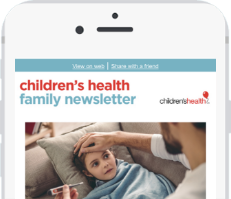Shortly after Andrew started crawling in 2015, he stopped using his arms and legs. His parents, Lisa and Thomas, didn't think much of it, but brought him to his pediatrician's office for a check-up, just in case. After examining Andrew, his pediatrician couldn't determine what was wrong. He suggested Lisa and Thomas bring Andrew to the emergency room to rule out any serious issues.
The family headed to Children's Medical Center Dallas, where they received shocking news: Andrew had a tumor the size of a grapefruit on his lower spine.
 Immediate care for a surprising diagnosis
Immediate care for a surprising diagnosis
Andrew was diagnosed with stage 3 neuroblastoma and admitted to the Pauline Allen Gill Center for Cancer and Blood Disorders at Children's Health℠. There, he and his family met Tamra Slone, M.D., Pediatric Oncologist at Children's Health and Associate Professor at UT Southwestern, who explained the urgency of Andrew's treatment plan.
"Because the size and location of the tumor was already affecting his mobility, Dr. Slone wanted to begin treatment right away," says Thomas.
Andrew started a three-day regime of chemotherapy before returning home. Over the next few months, Andrew underwent three more rounds of treatment before his cancer was declared in remission – just three days before his first birthday.
Continued support to thrive as a survivor
 Andrew began physical and occupational therapy over the next several months to regain his mobility and learn to eat again. Over the next two years, Dr. Slone closely monitored his progress, and Andrew had regular scans to ensure the tumor had not increased in size.
Andrew began physical and occupational therapy over the next several months to regain his mobility and learn to eat again. Over the next two years, Dr. Slone closely monitored his progress, and Andrew had regular scans to ensure the tumor had not increased in size.
In 2018, Andrew transitioned into the After the Cancer Experience (ACE) Program, the first and largest childhood cancer survivor program in North Texas. The ACE program recognizes that many childhood cancer survivors, like Andrew, may be at risk for unique medical issues or side effects stemming from their cancer or treatment. Fortunately, Andrew hasn't shown any concerning symptoms, but the ACE Program provides a personalized plan for long-term, follow-up care and quick access to expert care if an issue does arise.
"Andrew's last scan confirmed that even though the tumor is still there, its size is no longer an issue, and it may simply be just scar tissue," says Thomas. "At this point, you'd never know he had any medical issues earlier in his life."
 Andrew will turn 5 soon, and these days, his focus is on building things, riding his bike, helping take care of his two younger sisters and learning several languages at school and at home. Lisa and Thomas feel grateful and hopeful for his future.
Andrew will turn 5 soon, and these days, his focus is on building things, riding his bike, helping take care of his two younger sisters and learning several languages at school and at home. Lisa and Thomas feel grateful and hopeful for his future.
"When we look back to the time when Andrew was sick, we definitely admit that it was hard," says Thomas. "But we had a lot of support and faith on our side so we feel very blessed."
Learn more
The After the Cancer Experience (ACE) Program at Children's Health is the first and largest cancer survivor program in North Texas that bridges medical care from childhood to adult life within a centralized medical system. Learn more about our comprehensive oncology services and programs.

Thank you!
You are now subscribed to the Children's Health Family Newsletter.
Children's Health will not sell, share or rent your information to third parties. Please read our privacy policy.
